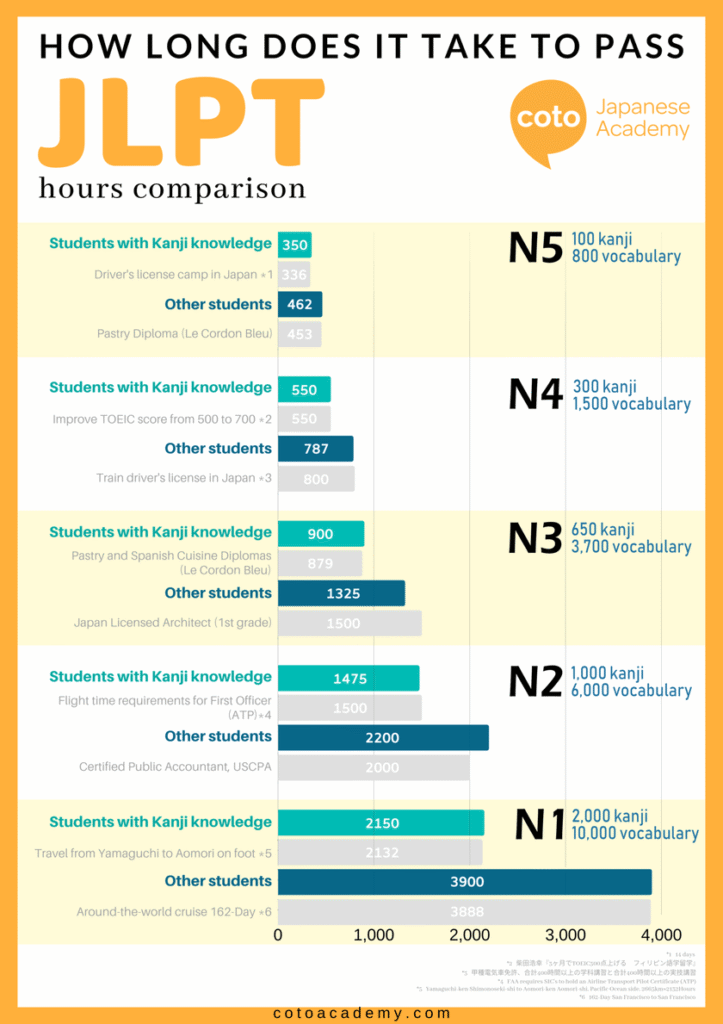How many study hours do you need to pass the JLPT? The Japanese Language Proficiency Test is the benchmark for your knowledge of the Japanese language. One of the first questions that probably comes to mind is: “How long do I need to prepare for the JLPT?”
The answer isn’t the same for everyone. It depends on things like your current level, how you study, and whether you’ve learned the language before. Still, having a rough idea of the time commitment for each level (from N5 to N1) can really help with planning and staying motivated.
In this post, we will show you some interesting comparisons of the number of JLPT study hours it will take you to pass each exam level.
Aiming for the July or December JLPT?
Getting ready for the JLPT? Boost your chances of passing with Coto Academy’s JLPT Prep Course. We have a special 3-month program specifically dedicated to help you learn and succeed in gramma, vocabulary, kanji, and reading strategies. You’ll learn with native instructors who has years of experience teaching Japanese. Historically, our students have had double the passing rate compared to the global average. We don’t just teach Japanese; we teach you how to beat the test.
Study Hours Needed to Study JLPT N5 to N1

| JLPT level | Hours needed to study | |
| With kanji knowledge | Without kanji knowledge | |
| N5 | 350 hours | 400 – 500 hours |
| N4 | 550 hours | 800 – 1,000 hours |
| N3 | 900 hours | 1,325 hours |
| N2 | 1,500 hours | 2,200 hours |
| N1 | 2,150 hours | 3,900 – 4,500 hours |
The number of study hours needed to pass the JLPT can vary a lot depending on the learner. If you’re living in Japan or regularly exposed to Japanese, especially kanji, you may be able to progress more quickly thanks to daily practice and immersion. Similarly, learners who already know Chinese or Korean often need fewer hours because of shared kanji or grammar patterns.
Note that the numbers above are cumulative totals. For example, to reach JLPT N2, you need about 1,500–2,200 hours total, not just 1,000 hours after passing N3. If you have already passed N4 and are aiming for N3, you’d need around 250–400 more hours, depending on your level.
To help you plan, here’s a breakdown of the estimated total study hours for each JLPT level, along with how many days it might take if you study 1 hour a day. We’ll also include how those numbers change if you study 2 hours daily.
How many days to study for the JLPT?
| JLPT level | Days needed (1 hour/day) | Days needed (2 hours/day) |
|---|---|---|
| N5 | 250 – 400 days | 125 – 200 days |
| N4 | 600 – 750 days | 300 – 375 days |
| N3 | 950 – 1,100 days | 475 – 550 days |
| N2 | 1,600 – 2,200 days | 800 – 1,100 days |
| N1 | 2,150 – 4,500 days | 1,075 – 2,250 days |
What do these numbers mean?
Some learners can reach JLPT N5 in just 6 months, and with intensive study, it’s even possible to pass JLPT N1 within 2 years. But how long it takes depends on how much time you put in consistently. Here’s a general breakdown based on studying 1 hour per day:
- N5: If you study just 1 hour per day, you could be ready in under a year.
- N4: Builds on N5 with more vocabulary and grammar. Studying 1 hour a day means about 1.5 to 2 years of study.
- N3: Intermediate level, with a big jump in vocabulary and kanji. It can take around 3 years at 1 hour per day.
- N2: Upper-intermediate, where you handle complex grammar and real-world materials. This level often takes 4.5 to 6 years at 1 hour per day.
- N1: It may take around 6 years of 2 hours per day study, or up to 12+ years if you’re studying lightly!
Want to study JLPT with the best native tutors?
Study Hours Needed for JLPT N5
Estimated study time: 350 – 500 hours
The number of study hours increases quite a bit when you’re starting Japanese from scratch, since you first need to learn the basics—like hiragana and katakana—before even beginning to tackle kanji and grammar.
Study Hours Needed for JLPT N4:
Estimated study time: 550 – 1,000 hours
JLPT N4 builds upon what you learned in N5. You’ll expand your vocabulary to around 1,500 words and know about 300 kanji. Grammar becomes a bit more complex, and you’ll begin to understand more conversational Japanese, such as simple instructions, or casual dialogue.
Study Hours Needed for JLPT N3:
Estimated study time: 900 – 1,325 hours
N3 represents a big jump in difficulty and marks the shift to intermediate Japanese. You’ll need to know around 650 kanji and 3,700 vocabulary words. At this level, you should be able to understand written and spoken content on everyday topics with some abstract language.
Study Hours Needed for JLPT N2:
Estimated study time: 1,500 – 2,200 hours
N2 is often required for working in Japan or entering a Japanese university. You’ll be expected to know about 1,000 kanji and 6,000 vocabulary words. The test includes more complex texts, nuanced grammar, and fast-paced spoken Japanese.
For students with kanji knowledge, it takes around 1475 hours to study for the JLPT. This number is equivalent to becoming a co-pilot of an aircraft! For other students, it’s 2,200 hours, which is almost the same time it would take to get a USCPA (Certified Public Accountant).
Study Hours Needed for JLPT N1:
Estimated study time: 2,150 – 4,500 hours
To pass JLPT N1, it generally takes 3,900 – 4,500 hours to study without any prior kanji knowledge. If you already know most of the kanji, it requires around 2,150 hours.
You might notice there’s a big jump between JLPT N2 and N1. The difficulty gap is significant, with N1 requiring much deeper understanding of grammar, vocabulary, and kanji. Because of this, many learners spend one to three years just moving from N2 to N1, even after years of study to reach N2.
To put that into perspective: 2,150 hours is about the same amount of time it would take to walk from the southern tip of Yamaguchi Prefecture to the northern edge of Aomori Prefecture, which is a journey across the length of Japan’s main island, Honshu. And 4,500 hours? That’s roughly the time it would take to travel around the world on a cruise ship!
Pass the JLPT with Coto Academy!
Now that you know how much time it takes to prepare for the JLPT, it’s time to make a plan! The best way to pass the JLPT is by studying at a top language school like Coto Academy.
Coto Academy offers both online and in-person JLPT preparation courses in Tokyo, led by experienced instructors who will guide you through every section of the exam. Whether you’re aiming for N5 or N1, our focused, supportive environment will help you stay motivated and on track. Ready to pass the JLPT with confidence? Join Coto Academy!
Want more tips on how to pass the JLPT? Check out our other in-depth guides and start preparing smarter today!
- Ultimate Guide to Taking JLPT N5
- Ultimate Guide to Passing JLPT N4
- Ultimate Guide to Taking JLPT N3
- Ultimate Guide to Taking JLPT N2
- Ultimate Guide to Taking JLPT N1
FAQ on JLPT study hours
How many hours does it take to pass the JLPT N5?
It typically takes around 350 to 500 hours of study to pass the JLPT N5. This level covers basic grammar, vocabulary, and hiragana/katakana.
Can I pass the JLPT by studying on my own?
Yes, many learners pass the JLPT through self-study, but joining a structured course like those at Coto Academy can significantly improve your efficiency and chances of success.
Is it possible to become fluent in Japanese in 2 years?
Yes, it’s possible if you study consistently and immerse yourself. To reach conversational fluency, aim for 1.5–3 hours of study per day, practice speaking regularly, and expose yourself to real Japanese (TV, podcasts, books).
Can I pass JLPT N3 in 1 year?
Yes, you can pass JLPT N3 in 1 year if you study around 3 hours per day consistently. It takes around 900 – 1,325 hours to study for JLPT N3.
